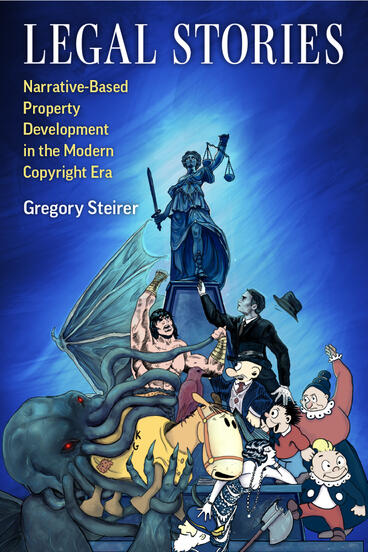Legal Stories
Narrative-Based Property Development in the Modern Copyright Era
How copyright law and the practice of narrative-based property development influenced each other before 1978
Description
Tracing the emergence of what the media industries today call transmedia, story worlds, and narrative franchises, Legal Stories provides a dual history of copyright law and narrative-based media development between the Copyright Act of 1909 and the Copyright Act of 1976. Drawing on archival material, including legal case files, and employing the principles of actor-network theory, Gregory Steirer demonstrates how the meaning and form of narrative-based property in the twentieth century was integral to the letter and practice of intellectual property law during this time.
Steirer’s expansive view of intellectual property law encompasses not only statutes and judicial opinions, but also the everyday practices and productions of authors, editors, fans, and other legal laypersons. The result is a history of the law as improvisatory and accident-prone, taking place as often outside the courtroom as inside, and shaped as much by laypersons as lawyers. Through the examination of influential legal disputes involving early properties such as Dashiell Hammett’s Sam Spade, H. P. Lovecraft’s Cthulhu Mythos, and Robert E. Howard’s Conan the Barbarian, Steirer provides a ground’s eye view of how copyright law has operated and evolved in practice.
Gregory Steirer is Associate Professor of English and Film & Media Studies at Dickinson College and the author (with Alisa Perren) of The American Comic Book Industry and Hollywood.
Reviews
“Legal Stories is a brilliant piece of scholarship that reveals not just how copyright shapes and limits how we can tell stories, but also how copyright is itself a product of narrative. By interrogating the stories that we have been told about intellectual property, Gregory Steirer deepens our understanding of both culture and the law.”
- Derek Johnson
—Derek Johnson, author of Media Franchising: Creative License and Collaboration in the Culture Industries
“Legal Stories is detailed, careful, and nuanced. To my knowledge, no other book-length work has given as much serious attention to the ways in which copyright law—not just as a general idea, but as a specific legal institution with particular and idiosyncratic requirements and repercussions—has shaped the expansion of transmedia/franchise storytelling.”
- Shawna Kidman
—Shawna Kidman, author of Comic Books Incorporated: How the Business of Comics Became the Business of Hollywood
"Gregory Steirer masterfully reveals how narrative-based properties formed due to struggles between diverse legal, creative, and managerial actors over interpretations of copyright law throughout the 20th century. Eloquent, meticulous, and convincing, Legal Stories makes legal theories accessible and invites readers to revisit their understanding of franchise development processes."
- Alisa Perren
--Alisa Perren, Professor and Director of the Center for Entertainment and Media Industries, Department of Radio-Television-Film at University of Texas at Austin

